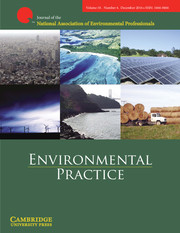Crossref Citations
This article has been cited by the following publications. This list is generated based on data provided by
Crossref.
Sherren, Kate
Robin, Libby
Kanowski, Peter
and
Dovers, Stephen
2010.
Escaping the disciplinary straitjacket.
Journal of Global Responsibility,
Vol. 1,
Issue. 2,
p.
260.
Vincent, Shirley
and
Focht, Will
2011.
Interdisciplinary environmental education: elements of field identity and curriculum design.
Journal of Environmental Studies and Sciences,
Vol. 1,
Issue. 1,
p.
14.
Gillenwater, Michael
2011.
Filling a gap in climate change education and scholarship.
Greenhouse Gas Measurement and Management,
Vol. 1,
Issue. 1,
p.
11.
Romsdahl, Rebecca J.
and
Hill, Michael J.
2012.
Applying the learning community model to graduate education: linking research and teaching between core courses.
Teaching in Higher Education,
Vol. 17,
Issue. 6,
p.
722.
Gosselin, David
Parnell, Rod
Smith-Sebasto, Nicholas J.
and
Vincent, Shirley
2013.
Integration of sustainability in higher education: three case studies of curricular implementation.
Journal of Environmental Studies and Sciences,
Vol. 3,
Issue. 3,
p.
316.
Gosselin, Dave
Cooper, Sara
Bonnstetter, Ronald J.
and
Bonnstetter, Bill J.
2013.
Exploring the assessment of twenty-first century professional competencies of undergraduate students in environmental studies through a business—academic partnership.
Journal of Environmental Studies and Sciences,
Vol. 3,
Issue. 3,
p.
359.
Vincent, Shirley
and
Mulkey, Stephen
2015.
Transforming US higher education to support sustainability science for a resilient future: the influence of institutional administrative organization.
Environment, Development and Sustainability,
Vol. 17,
Issue. 2,
p.
341.
Proctor, James D.
2015.
Theory in, theory out: NCSE and the ESS curriculum.
Journal of Environmental Studies and Sciences,
Vol. 5,
Issue. 2,
p.
218.
Proctor, James D.
Bernstein, Jennifer
and
Wallace, Richard L.
2015.
Introduction: unsettling the ESS curriculum.
Journal of Environmental Studies and Sciences,
Vol. 5,
Issue. 2,
p.
195.
Glasser, Harold
2016.
Toward the Development of Robust Learning for Sustainability Core Competencies.
Sustainability: The Journal of Record,
Vol. 9,
Issue. 3,
p.
121.
Gosselin, Dave
Cooper, Sara
Lawton, Sydney
Bonnstetter, Ronald J
and
Bonnstetter, Bill J
2016.
Lowering the walls and crossing boundaries: applications of experiential learning to teaching collaboration.
Journal of Environmental Studies and Sciences,
Vol. 6,
Issue. 2,
p.
324.
Vincent, Shirley
Roberts, J. Timmons
and
Mulkey, Stephen
2016.
Interdisciplinary environmental and sustainability education: islands of progress in a sea of dysfunction.
Journal of Environmental Studies and Sciences,
Vol. 6,
Issue. 2,
p.
418.
Vincent, Shirley
and
Dutton, Katelyn
2016.
Three leadership perspectives on US interdisciplinary environmental and sustainability programs: a review of the findings of the 2003-2014 studies of the Center for Environmental Education Research, National Council for Science and the Environment.
Journal of Environmental Studies and Sciences,
Vol. 6,
Issue. 2,
p.
405.
Noy, Sue
Patrick, Rebecca
Capetola, Teresa
and
McBurnie, Janine
2017.
Inspiration From the Classroom: A Mixed Method Case Study of Interdisciplinary Sustainability Learning in Higher Education.
Australian Journal of Environmental Education,
Vol. 33,
Issue. 2,
p.
97.
Vincent, Shirley
2017.
Response: Theory in, theory out: NCSE and the ESS curriculum.
Journal of Environmental Studies and Sciences,
Vol. 7,
Issue. 2,
p.
200.
Whiley, Dona
Witt, Bradd
Colvin, R. M.
Sapiains Arrue, Rodolfo
and
Kotir, Julius
2017.
Enhancing critical thinking skills in first year environmental management students: a tale of curriculum design, application and reflection.
Journal of Geography in Higher Education,
Vol. 41,
Issue. 2,
p.
166.
Trencher, Gregory
Vincent, Shirley
Bahr, Kyle
Kudo, Shogo
Markham, Kate
and
Yamanaka, Yasuhiro
2018.
Evaluating core competencies development in sustainability and environmental master's programs: An empirical analysis.
Journal of Cleaner Production,
Vol. 181,
Issue. ,
p.
829.
Proctor, James D.
Bernstein, Jennifer
Brick, Philip
Brush, Emma
Caplow, Susan
and
Foster, Kenneth
2018.
Environmental engagement in troubled times: a manifesto.
Journal of Environmental Studies and Sciences,
Vol. 8,
Issue. 3,
p.
362.
Janssen, Marco A.
Smith-Heisters, Skaidra
Aggarwal, Rimjhim
and
Schoon, Michael L.
2019.
‘Tragedy of the commons’ as conventional wisdom in sustainability education.
Environmental Education Research,
Vol. 25,
Issue. 11,
p.
1587.
Ruesch Schweizer, Corinne
Di Giulio, Antonietta
and
Burkhardt-Holm, Patricia
2019.
Scientific Support for Redesigning a Higher-Education Curriculum on Sustainability.
Sustainability,
Vol. 11,
Issue. 21,
p.
6035.




